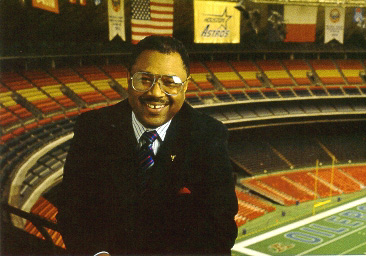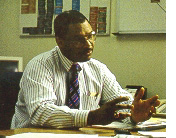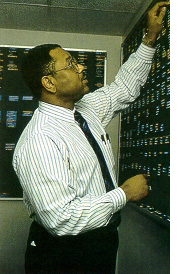 A PSA TEST ALLOWED THE ASTRO’S BOB WATSON TO STAY IN THE GAME…
A PSA TEST ALLOWED THE ASTRO’S BOB WATSON TO STAY IN THE GAME…
An Exclusive Interview with former Astros General Manager Bob Watson
by PERSPECTIVES Editor Barbara Payne
 It has been a long, and sometimes winding road from Fremont High School in Los Angeles to the Baseball Hall of Fame, but Bob Watson has loved every step along the way.
It has been a long, and sometimes winding road from Fremont High School in Los Angeles to the Baseball Hall of Fame, but Bob Watson has loved every step along the way.
His professional baseball career began with the Astros in January 1965. Bob played 15 full seasons, had a .295 lifetime average, hit 184 homers and batted in 989 runs. A pair of his spikes are in the Baseball Hall of Fame for scoring the game’s one millionth run on May 4, 1975. He sports two World Series Championship rings — one on each hand — one earned with the Yankees and one with the Oakland A’s.
Last fall (1994), after 30 years in the game and on his 25th wedding anniversary, Bob Watson was promoted to General Manager of the team that gave him his start. He is the first minority to reach that position in the game of professional baseball.
“This is something I’ve wanted all of my life and now I was absolutely at the top of my career. Then, seven months later," recalls Watson, “something happened to threaten that. A few months after the team made a spectacular start for the season, I sat in a doctor’s office and listened to him tell me that I had cancer. Well, that got my attention."
“The date for my annual team physical fell on a Sunday, which also happened to be my birthday, April 10th. So, I elected to spend the day with my wife and take the physical later. In May, I still hadn’t done it when the team doctor called to remind me."
“I finally scheduled an appointment and, as a part of the exam, I asked the doctor to give me a PSA test instead of the digital rectal exam. A couple of scouts I knew had been diagnosed with prostate cancer the year before and they had urged me to ask for the test."
“Well, the doctors said, ‘No, no. You’re too young to do that. We don’t start giving the PSA blood test until you’re 50 or so…we’ll just do the digital exam.’"
“I insisted. ‘Nope,’ I said. ‘Do the PSA.’ Well the results came back 5.8, which raised a red flag for the team Urologist. He ordered some more tests and a biopsy."
“When Dr. Guerrero called and asked me to bring my wife along for a meeting, my antennas went way up there. He told us that out of the six core biopsies, one came back with very aggressive cancer."
“When I heard the diagnosis, it was scary. My anxiety level went way up. There were all kinds of fears and thoughts racing through my mind."
“I asked about surgery and all of the alternatives, and he said that, considering my age, the results of the bone scans and the fact that all the tests confirmed that the cancer was confined to the capsule of the prostate gland, he said he would recommend having surgery done immediately so it didn’t spread to the lymph nodes and all that good stuff. Now, this was just around the first of June, the team was playing pretty good, so I said, ‘Can I have this surgery at the end of the season?’ He said, ‘Yeah…but I want you to think about it.'"
“So, I talked it over with my wife and the owner of the team and we decided to go ahead and get it done. Then, the doctors told me to talk to three or four other doctors to get additional opinions, and also to select a surgeon. Dr. Bill Catalona, a doctor well respected in the field, was going to be in St. Louis over the fourth of July. Coincidentally, our team was going to be playing there at that time, so I figured that I’d just go up with the team and have it done. All through this process, I had strong support and encouragement from my wife, Carol, and from all the team."
 “I was really fortunate that the timing went the way it did. Dr. Catalona did the surgery on July 6th and here it is about six months later, and I am 90 percent back. The last PSA blood test I had was 0.1 and I don’t have to have another one until next May."
“I was really fortunate that the timing went the way it did. Dr. Catalona did the surgery on July 6th and here it is about six months later, and I am 90 percent back. The last PSA blood test I had was 0.1 and I don’t have to have another one until next May."
“The doctors were concerned that the cancer was right up next to the gland wall and that perhaps some had escaped…not so. No chemo, no radiation; in fact, I believe that the good Lord was definitely on my shoulder."
“I think the real reason why I was diagnosed — with all of the circumstances that went with this — is because of the chair that I sit in as the general manager of a professional baseball team. I can now stand up on a soap box and say, “This disease will hit anybody, this is a disease you have to address…let’s get educated on it.’ Minorities have a higher rate of prostate cancer and you have another strike against you if there’s prostate cancer in your immediate family. My Dad had a PSA of 45 or so and was diagnosed before I was."
“Dr. Catalona also told me, although they don’t know why, that if you lived in the San Francisco Bay area — which I did for five years coaching the Oakland A’s — you have a higher risk of prostate cancer."
 “I’d like to get the message out to all men, and especially minorities, that if you’re 40 and you’ve had a family history of prostate cancer, you need to start taking early screenings — both the PSA blood test and the digital rectal exam (DRE). They told me that digital exam alone would have probably missed my cancer for another couple of years, and with the kind of cancer I had, it would have been too late."
“I’d like to get the message out to all men, and especially minorities, that if you’re 40 and you’ve had a family history of prostate cancer, you need to start taking early screenings — both the PSA blood test and the digital rectal exam (DRE). They told me that digital exam alone would have probably missed my cancer for another couple of years, and with the kind of cancer I had, it would have been too late."
“I felt fine. No symptoms. No pains. No nothing. I’m just grateful that knowing two scouts who had been diagnosed with prostate cancer by PSA test had made me aware that the test was available."
“Before all this happened, I really knew zip, zero about prostate cancer. I guess I knew that older men had a lot of problems with their prostate, I knew that men died of it, and I also knew of some older players who had hip replacements because their cancer was discovered after it had gotten into the bone."
“That’s why I’m so eager and ready to talk about it now. We have to pay attention to this to get early detection. My son is 24 years old, and now I tell him he has to take really good care of himself, and maybe get a PSA at age 30."
“There is another thing that I’d really like to talk about because it’s important…and it has to do with the ‘macho-ness’ of guys. Guys don’t like the digital exam; that’s a given. We have to get past that if we’re going to catch this disease early. It is the combination of the DRE and the PSA test that is catching the disease at the early stages when treatment is possible and effective. If you go out into the locker room, the guys will say, ‘No way!’ They won’t even go to a doctor for a physical because of the digital exam."
“I think knowing that having that exam and the PSA test can save your life has to make a difference in the way we view these procedures. Hey, I’m living proof…."
Interview 12/23/95
PERSPECTIVES Volume 1 Number 1

